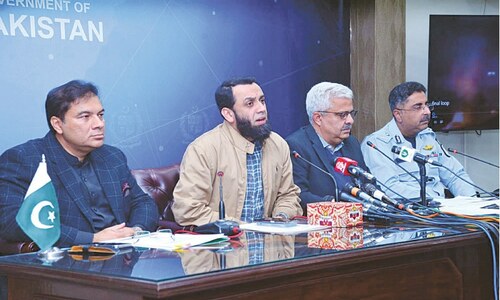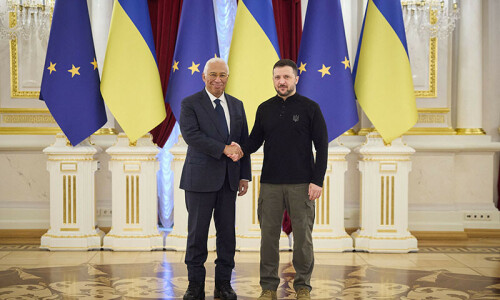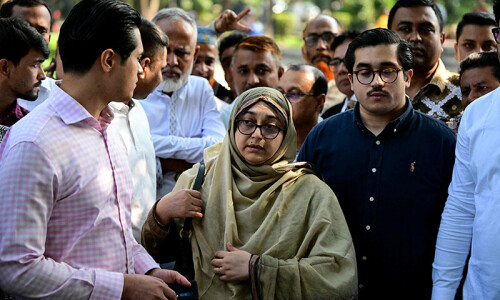ISLAMABAD: Prime Minister Imran Khan has reiterated his government’s resolve to continue facilitating the construction industry in order to create wealth and boost the country’s exports.
Addressing the inaugural ceremony of a three-day ICCI Pakistan Property, Housing and Construction Expo 2021 here on Friday, the prime minister said the government had removed many impediments though some more obstacles were still confronting the construction sector.
Minister of State for Information Farrukh Habib, PM’s special assistant Shahbaz Gill, Naya Pakistan Housing and Development Authority Chairman retired Lt Gen Anwar Ali Haider and Islamabad Chamber of Commerce and Industry president Sardar Yasir Ilyas attended the event.
The expo featured the pavilions of commercial banks, Board of Investment, State Bank of Pakistan, companies and businesses related to the construction industry, including real estate developers, marketing firms, cement, marble, tiles, electronics, cable and many others. Educational institutes also have presence there as the event also aims to promote industry-academia linkage.
The prime minister, who took a round of the expo, urged the business sector to ensure availability of raw material of the construction industry to reduce the country’s import bill.
Urges business community to pay taxes enabling government to spend on education, health sectors
He said that with the introduction of housing finance facility by the government for the low-income group, the country’s 220 million population would become an asset as the construction of houses would positively impact all allied industries. Unfortunately, the previous governments never thought of the poor segment, but the incumbent government had opened the avenue and was striving to uplift the low-income group.
Exemplifying China and India, Mr Khan said the former had steered around 800 million people out of poverty by uplifting the poor while the latter failed to do so as the elite had captured the economy there.
The prime minister said that in Pakistan, too, perks and facilities had been limited to a specific class like English medium schools and private hospitals which consequently compromised the quality of public sector facilities. He told the critics that systemic reformation was in fact the change of mindset requiring a constant struggle.
PM Khan said Finance Minister Shaukat Tarin, who came from the private sector, was cognisant of the problems faced by the construction industry which provided most of the employment opportunities. He said promotion of the construction industry would lead to wealth creation and revenue generation, besides bringing about export boom.
The prime minister said Singapore’s exports were around $300 billion while Pakistan would hardly touch $30bn mark this year. Assuring the business sector of all-out facilitation, he also urged them to pay taxes enabling the government to spend on improvement of infrastructure like education and health.
As pointed out by the ICCI president, the prime minister assured that the issue of renewal of lease for industrial units in Islamabad would be resolved after discussion at the National Coordination Committee on Construction (NCCC).
Anwar Ali Haider appreciated the ICCI president’s offer for construction of one million houses under the Naya Pakistan Housing Programme in pursuance of the prime minister’s vision. He told the gathering that the NCCC had held more than 100 meetings to discuss the relevant issues and facilitation of the construction industry.
ICCI President Yasir Ilyas appreciated the launching of a package for the construction industry and said it had protected daily wagers from unemployment, particularly during the Covid-19 pandemic.
He said the reduction of 50 per cent duty on tourism-related imports was also a good step towards exploiting the immense potential of tourism. He called for development of a new industrial estate in Islamabad, offering a financial support of Rs4bn from Islamabad’s business community.
Food security
Prime Imran Khan said food security and improved nutrition were big challenges facing developing countries and China’s innovative Juncao technology could prove helpful in tackling these challenges, poverty alleviation and sustainable development.
“Such innovative, affordable and eco-friendly technologies may help catalyse our progress towards achieving the first two Sustainable Development Goals: no poverty and zero hunger,” the prime minister said in a video message screened at the Forum on the 20th Anniversary of Juncao Assistance and Sustainable Development Cooperation.
Juncao, which is famed as magic grass, is two Chinese characters meaning mushroom and grass. The particular breed of grass was discovered by Chinese scientists to be an economical and environment-friendly substitute for timber traditionally used as a substrate for growing mushrooms.
Prime Minister Khan said the world at large and the people of the global south in particular were grappling with multiple challenges, including climate change, poverty and most of all food insecurity.
He congratulated China on hosting the event and Prof Lin Zhanxi on inventing Juncao technology. He also commended China for sharing the beneficial Juncao technology with over 100 countries, which had already benefited thousands of people across the continents over the past 20 years.
He mentioned that the technology also helped in combating desertification and it could be used as food for livestock, for being protein rich.
The prime minister emphasised on sustainable ways of achieving economic recovery, growth and development as critical during the pandemic. He said that with relentless efforts towards ending poverty in all its manifestations, extreme poverty had been steadily declining over the past two decades.
Mr Khan termed China a role model for developing countries in poverty alleviation. “China’s remarkable growth has brought 800 million people out of poverty over the past four decades,” he said.
He lauded China’s leadership role in climate change and commended President Xi’s vision of a prosperous, clean and beautiful world and initiative to achieve carbon neutrality by 2060. The prime minister said that poverty alleviation and tackling climate change were his government’s key priorities.
Published in Dawn, September 4th, 2021












































Dear visitor, the comments section is undergoing an overhaul and will return soon.